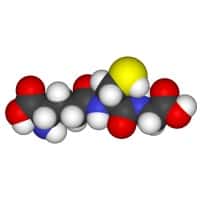A research team at Oregon State University has determined that glutathione may help ward off toxins that are an underlying cause of aging. Glutathione levels decline with age, which opens the door for a wide range of age-related health issues. A recent study, published in the journal Redox Biology, also highlighted a compound – N-acetyl-cysteine, or NAC – which is currently in use in high doses for the purpose of medical detoxification emergencies. The researchers stated that at much lower levels, NAC may help maintain glutathione levels and prevent the usual metabolic decline that occurs with aging. Looking at it from this angle, research offers not only some profound insights into why animals health declines with age, but also reveals a specific compound that could help prevent some of the toxic processes involved.
The researchers believe that the decline of these detoxification pathways is incidentally linked to diabetes, cardiovascular disease, and cancer, which are some of the primary causes of human mortality. Tory Hagen, lead author on the research and the Helen P. Rumbel Professor for Health Aging Research in the Linus Pauling Institute at OSU, states that the importance of glutathione as a strong antioxidant has been known for some time. He goes on to say “What this study pointed out was the way that cells from younger animals are far more resistant to stress than those from older animals,” Hagen is also a professor of biochemistry at the OSU College of Science. “In young animal cells, stress doesn’t cause such a rapid loss of glutathione. The cells from older animals, on the other hand, were quickly depleted of glutathione and died twice as fast when subjected to stress. “But pretreatment with NAC increased glutathione levels in the older cells and largely helped offset that level of cell death.”
Hagen said that glutathione is such a vital antioxidant that its existence seems to date back as far as oxygen-dependent, or aerobic life itself. Or, in other words, about 1.5 billion years. Glutathione is a principal compound that detoxifies environmental stresses, heavy metals, air pollutants, pharmaceuticals and various other toxins.
In the current study, the researchers attempted to pinpoint the resistance to toxins of young cells, as compared to older cells. They utilized a toxic compound called menadione to stress the cells. As a result of that stress, the younger cells lost significantly less glutathione than older cells did. The levels of glutathione in the young rat cells never dipped to lower than 35 percent of its initial level. However, the older rat cells glutathione levels fell to 10 percent of their original level.
The researchers state that NAC iboosts the metabolic function of glutathione as well as increasing its rate of synthesis. It is currently used in emergency medicine to assist patients in a toxic crisis, for example ingestion of poisonous levels of heavy metals. It is known to be a very safe compound to utilize even at particularly high levels. Furthermore, the scientists believe that it may have significant value at much lower doses for maintaining glutathione levels and improving health. “I’m optimistic there could be a role for this compound in preventing the increased toxicity we face with aging, as our abilities to deal with toxins decline,” Hagen stated. “We might be able to improve the metabolic resilience that we’re naturally losing with age.”
Hagen believes that there appears to be a wide range of detoxification potential offered by glutathione. High levels of it in conjunction with NAC may help reduce the toxicity of cancer chemotherapies, certain prescription drugs, and treat other health problems. The researchers concluded that “Using NAC as a prophylactic, instead of an intervention, may allow glutathione levels to be maintained for detoxification in older adults,”




